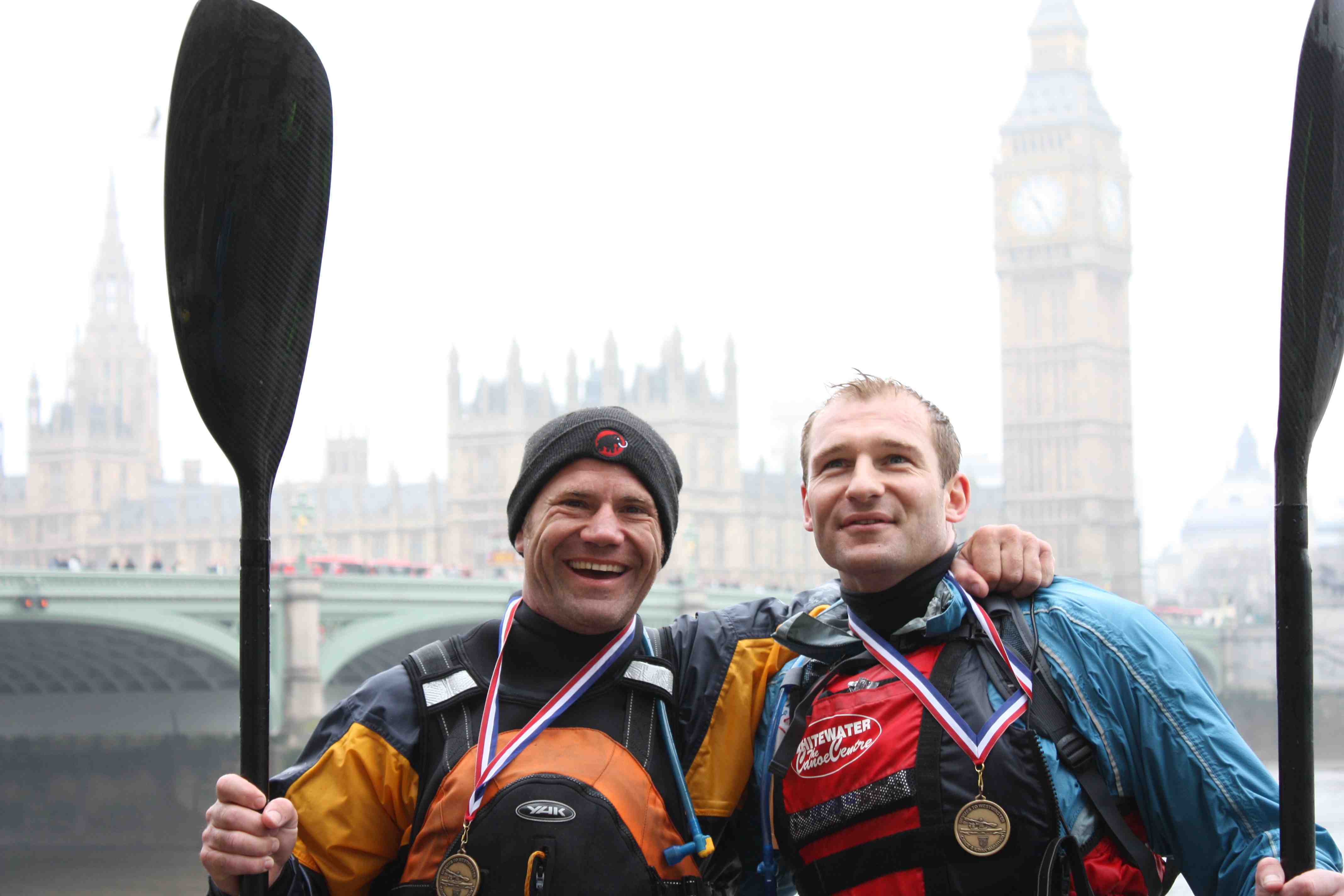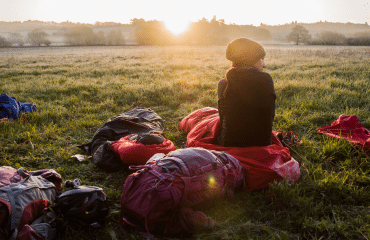
Each month I ask my guest blogger who I should invite to write the next one. Ed Stafford suggested I ask Steve Backshall.
Steve is is a naturalist, writer, adventurer and television presenter. He has kindly written this month’s guest blog post, an account of the miserable wonderfulness that is the 125-mile Devizes to Westminster canoe race. Here are his answers to the questions I ask each guest blogger, and then his story.
– What expedition or journey has inspired you the most?
My utter hero is Alfred Russell Wallace. A contemporary of Darwin, he explored regions of New Guinea and Borneo that are pretty out there even now. He was primarily a naturalist who discovered hundreds of new species and was developing his own theories of evolution, but was also a fearless adventurer… his real life adventures read like something out of a Ryder Haggard novel – I’md give anything to have been on one of his expeditions.– What’s your favourite travel or adventure book?
Well Wallace’s ‘Malay Archipelago’ would certainly be up there. I really love Tim Flannery’s writing too – frightening intellect and experience but with no ego evident in his writing whatsoever.– What’s your emergency iPod song when the mojo is failing you?
Hmmm, iPods are a dodgy one. The hard drives often fail at high altitudes, and you wouldn’t risk one in a sweaty jungle, so I rarely have it to hand when things get really gnarly! If I did though, it would be something with a high bpm to get the leg cadence going – perhaps a bit of drum-n-bass; Moises Modesto and ‘Cry For Freedom’… or maybe something super uplifting like Elbow’s ‘One Day Like This’.– What luxury item do you carry on your expeditions?
I don’t take luxuries. My food and kit bags are always too vast for that! My one hot tip though is super glue, it’s utterly essential for fixing everything from sleep mats to blisters and closing gaping cuts. On the Marathon Des Sables competitors were using it to glue the soles of their feet back on!– What do you miss the most when you are away?
Food. Every campfire conversation turns to food eventually!– What advice do you have for someone contemplating an adventure of their own?
Do it. Don’t spend too much time worrying about it, get out there and learn through your mistakes. My first expeditions were done solo with no support, no comms, woefully ill-prepared, but are still the ones I look back on most fondly.
Here is Steve’s account of the Devizes to Westminster Race. Having experienced the race for myself I can share his pain!
…I was borderline hypothermic, shivering uncontrollably, shoulder graunching and clicking with every stroke, and it all just seemed so pointless, so joyless, so endless.
Big events like this are all about small victories. No one is capable of saying to themselves, “right, 125miles to go, let’s rock!” You have to break it down, boost your spirits at every turn, keep resetting the clocks…
Read the rest of Steve’s race account, then buy his book:
As preparations for a major endurance race go (for the Devizes to Westminster, a 125mile non-stop canoe race that’s possibly the oldest endurance event in the world), they don’t get much worse than ours. We trained pretty hard right through the fiercest part of the winter, getting the hang of the tippy K2 kayak the hard way, by capsizing repeatedly on days where splashes froze instantly on our paddles and clothing, and you could have ice-skated into the lock cuts. These unplanned swims resulted in ice cream headaches, lungs so constricted it felt like you’d had a good punch in the guts and paddles home shivering uncontrollably thinking this was all a very bad idea.
However, we were just starting to feel like we were getting somewhere with our paddling, when my delayed expeditions came back to haunt me. For the three months leading up to the race, while everyone else on the DW was putting in four or five sessions a week, I was stuck in the deep jungle, and my training consisted of thrashing a blow-up dinghy up a whitewater river in New Guinea, and one paddle in a dugout canoe 20 odd miles down the Amazon with pink river dolphins playing alongside me. And that was it. I finished off my expeditions with a scorching set of tropical diseases, and arrived back in the UK five days before the start day with churning guts and ferocious jetlag. I have never been so badly prepared for anything in my life!
We set off at 830am on Easter Saturday, having timed our departure in the hope that we would arrive at the tidal part of the Thames some 20hours later, just as the high tide was receding and would therefore speed our way to Westminster. Get this wrong and you end up having to carry your boat through London over your shoulders as some pals of ours did a few years back. It’s an odd race in this respect; there’s no massed start, no hordes of people together at the beginning or indeed anywhere else on the race. In fact for the most part we cruised through the Home Counties and Thames Valley towns with their inhabitants totally oblivious to our passing.
The first fourteen miles of the race is just an ‘orrible slog. Throughout the DW you have to portage 77 locks, and they become like a shining beacon ahead – a chance to break up the race into achievable portions, and an opportunity to put down the paddle and drop the shoulders for a few precious minutes. On this first section there are no locks at all. It’s very dull indeed. Beyond here though things change; seven locks in close succession are generally run by the stronger crews, with my injuries though we had to hop back into the boat between most of these, which slowed us right down.
On these earlier sections we were burning along at a fearsome pace, purring past flower-painted narrow boats, beardie tow-path scruffs with dogs on string, and enticing pub gardens where jeering customers would wave their pints at us. Damn them all. Probably the most dangerous obstacle was the swans, big males getting territorial as we passed the reed beds they were nesting in, and would arch their backs and head towards us with an impressive bow wave. Some of our fellow competitors ended up having to beat them off with their paddles, which sounds harsh unless you’ve been on the receiving end of one of these scary charges. However, after about thirty miles things started to go all wrong. First off my right shoulder started to hurt quite a lot. Five miles later I could barely raise my hands above chest level, another five and I couldn’t get out of the boat on the right hand side without help. For the whole of the rest of the race the pain was unremitting, and my paddling style was I’mm sure a subject of scorn for race aficionados.
At Dreadnought Reach, the canal flashes through Reading as it prepares for a big Saturday night out, and flows out into the Thames. Here most competitors pull up, change their clothes and get a proper meal in. The sun was setting in dazzling golds across the water from us, our bellies were full, painkiller levels were topped up, and we were on our home waters. As we passed the island at Henley, sleeping ducks and geese were frightened off the bank and flew straight off into our deck threatening to capsize us. They may well have been getting their own back for us inadvertently ramming a couple of mallards who were too busy making ducklings to notice us bearing down on them. We paddled off into the long night, positive and looking ahead to the lights of Marlow bridge. It was however about this time that something curious happened. All this stretch from Reading to Teddington was familiar to us, and we knew each section well, but somehow the very fabric of time seemed to have been distorted and stretched. One short haul of 1.8miles that in training had passed in the blink of an eye felt as if it took an hour. A 4.9mile chunk honestly felt like it would never, ever end. Whilst in endurance events the body is usually at its lowest ebb between 3 and 4 in the morning, for me it hit me at around one as we approached Windsor. I was borderline hypothermic, shivering uncontrollably, shoulder graunching and clicking with every stroke, and it all just seemed so pointless, so joyless, so endless. There was another low when we reached Runnymede, which in my head I’md set as being the start of London, a major success-nearly there point. As we pulled out of the lock, someone shouted out; ‘You’re going great lads, just forty miles to go!’ Forty frickin’ miles. Near eight hours at our current speed. And that was the end of that little positive spell.
Big events like this are all about small victories. No one is capable of saying to themselves; ‘right, 125miles to go, let’s rock!’ You have to break it down, boost your spirits at every turn, keep resetting the clocks. For us, we did this by overtaking people between locks (they’d go past us again straight away as we took fifteen minutes to neck a Cuppa Soup – but then I guess we got to overtake them again on the next stretch). We got on our way at Teddington and the tidal Thames around two hours behind schedule, but with spirits passably high. We were going to finish, it was just a case of when. However, the tidal Thames is not to be taken lightly. We’d missed the main flow of the tides, and it actually didn’t seem to be running at all. That last 17miles may as well have been a thousand. It’s another yomp with no locks, turbulent waters, and speedboats creating huge washes that threaten to overturn you several minutes cold swim from either bank. We pulled in to Putney Bridge where my mum and dad were waiting, and appeared to them as phantoms, walking like our bones had dissolved, just wanting it all to be over. Mum applied cold spray to Stuart’s agonised backside (she swears she didn’t look) and I guzzled leek and potato soup and tried not to sit down in the mud cos I’md never have got up again.
The last six miles was probably our strongest paddle of the whole race. We didn’t rest once and did it in well under an hour, scorching past Battersea power station and other London landmarks we really couldn’t have cared less about, yelling at the speedboats who seemed to be deliberately trying to capsize us with their wash. Three miles to go, two, one, and then there it was, Big Ben and the Houses of Parliament. In a cruel twist of fate, this last mile was the most difficult of the whole race, churned up and unpredictable. It flushed more than one fatigued set of finishers, but not us. We pulled up to the steps up the embankment, elated, exhausted, more than anything relieved that the evil nastiness was over and would never have to be repeated. Please God.


Adore Steve Backshall and what he does! He has inspired me to do new things and push myself a bit harder. I may even be tempted to hold a big spider or snake! Or take up something new & persevere with climbing. Glad Steve is ok after accident last year.
Well I’ll leave the big snakes to you, Sarah! A bit scary for me!
only just seen this post – my boys love Steve Backshall. He presents Deadly 60 on CBBC and we love watching him, he’s so enthusiastic!
Just wanted to say how much my daughter and i enjoy steves show deadly sixty.He makes learning about wildlife so interesting and he is a true insperation to children.I admire his total outlook to life and his respect wild animals.
i think you r amazing i loveyaaa program i watch every time its on i love ittt sooo much! but i will leave all the snakes an spiders up 2 yaaa i do love them loads mee iam a animal lover tarrraaa :)xxxxxxbills
My boyfriend really like Steve Backshall and I kinda like him too!
I really love what Sarah put as the first comment to this post. So spot on, it’s how I feel as well.
I love Steve Backshall’s style of writing – it’s so confident and honest. I’ve read this article a few times already and still find joy in rereading it – knowing that despite how tough this experience was he was able to persevere and at the end can stand with his friend with a giant cheeky-boy smile on his face. People seem to think that because Steve Backshall’s programmes are aimed at a younger audience, adults won’t be inspired as well, but we are. I’m 30, I’m a girl (or should that be woman now?) and I find myself feeling inspired to ‘get out there and try something new’. Happy with snake handling, still not sure about kayaking though – anyone heard of Weil’s Disease?!
what animal are you afraid of most and if u could be a animal what would you be ?